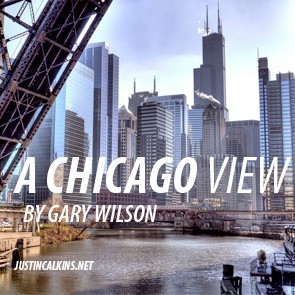 Commentary
Commentary
By Gary Wilson
In the past two weeks Chicago has been the center of a rare commodity in the Great Lakes region: Forward-looking thought. And I mean the future, not just until the next election or fiscal year.
First, architect and MacArthur Foundation “Genius Award” winner Jeanne Gang presented her vision for transforming the Chicago River from that of an “open sewer” and invasive species highway to becoming a model of a 21st century urban waterway.
Gang’s proposal is conceptual, not an engineering plan. It’s meant to generate interest by the public and discussion that has been lacking. And judging by the large crowd that came to hear her speak, that interest exists.
At the same time Chicago Public Radio was also looking to the future.
Its Front & Center series that focuses on the Great Lakes hosted a one hour program about whether the region can truly collaborate for the greater good of the eight Great Lake states. Or will it continue to play in a zero sum economic game by competing with each other while the region’s combined strengths go untapped?
The consensus of the expert commentators is that the region’s governors see no political gain by collaborating. They’re focused on winning the jobs takeaway game that makes for nice press releases and ribbon cutting ceremonies when they win, but does nothing to strengthen the region.
Kudos to architect Gang for challenging the Chicago establishment to focus on the future. Let’s hope they are paying attention. But as forward-looking as Gang’s proposal is, it’s small potatoes next to developing a collaborative plan for the region.
And with the governors focused on jobs reports and budget cuts, where does that leave this region that’s in search of an identity or mission?
With a blank sheet of paper, which is where it has always been.
Unless you say our identity is “Rust Belt” which rivals the Chicago River’s “open sewer” for least desirable.
Who will lead?
So who to lead out of the morass of negative perceptions and realities?
It isn’t our Congressional delegation. It can assist but it’s constrained by party priorities and ideologies, archaic seniority systems and the reality of political gridlock that shows no signs of abating.
the reality of political gridlock that shows no signs of abating.
Mayors? Not really. Their boundaries are too small and their issues too localized to have any impact except at the margins.
How about the governors? They’re the group that’s proud of saying that governors can actually get things done.
But I don’t think so.
They’ve been the antithesis of collaboration and are now singularly focused on creating jobs, many times by trying to pirate them away from neighboring states. That’s when they’re not weakening environmental regulations to create a more business friendly climate.
Michigan’s governor even failed to attend the largest and most important Great Lakes conference ever that was barely an hour from his office. He had scheduling conflicts his press secretary told me but he does care about the Great Lakes, she said.
I’m sure he does. But c’mon — not even a cameo appearance? What kind of message does that send?
No, if you’re waiting for the governors to show visionary leadership as a regional body it’ll be a long wait.
Muddling along
Where does that leave us?
I’d love to be optimistic but optimism requires something to support it.
I suspect the region will muddle along as it has for decades.
Jobs will come and go. Small environmental victories will be offset by degradations that result from the newly resuscitated jobs versus the environment mentality. The one that says a way to increase jobs is to weaken environmental protections. And the region’s brain drain will continue.
That’s the likely scenario given the current mindset of our governors.
It doesn’t take a genius to figure that out.
